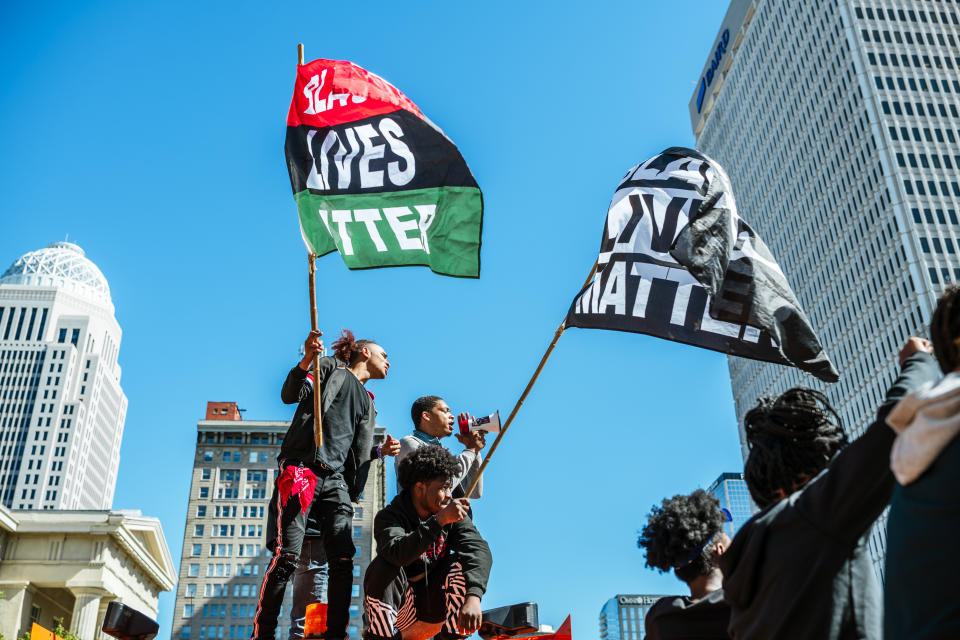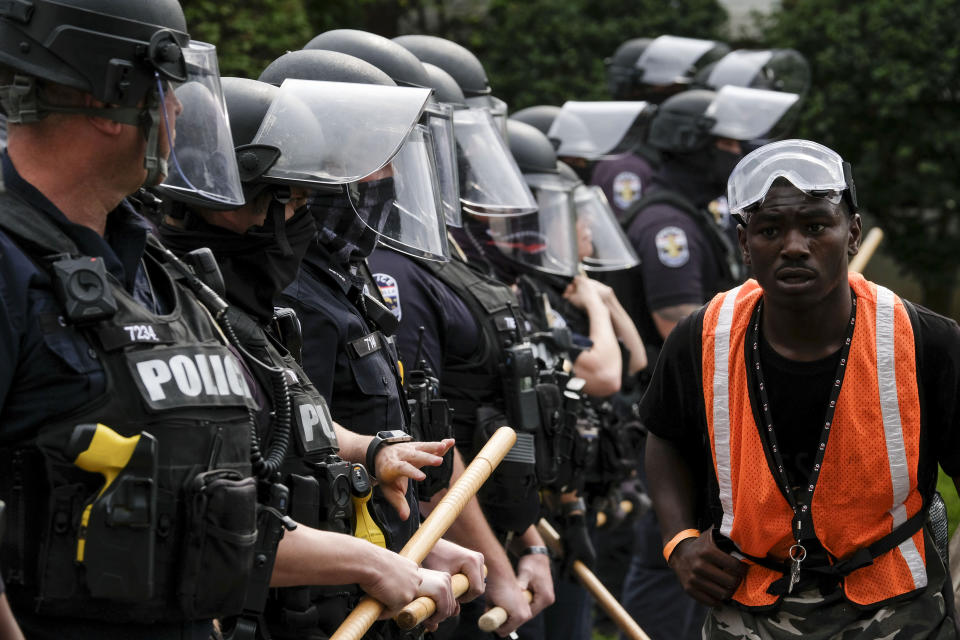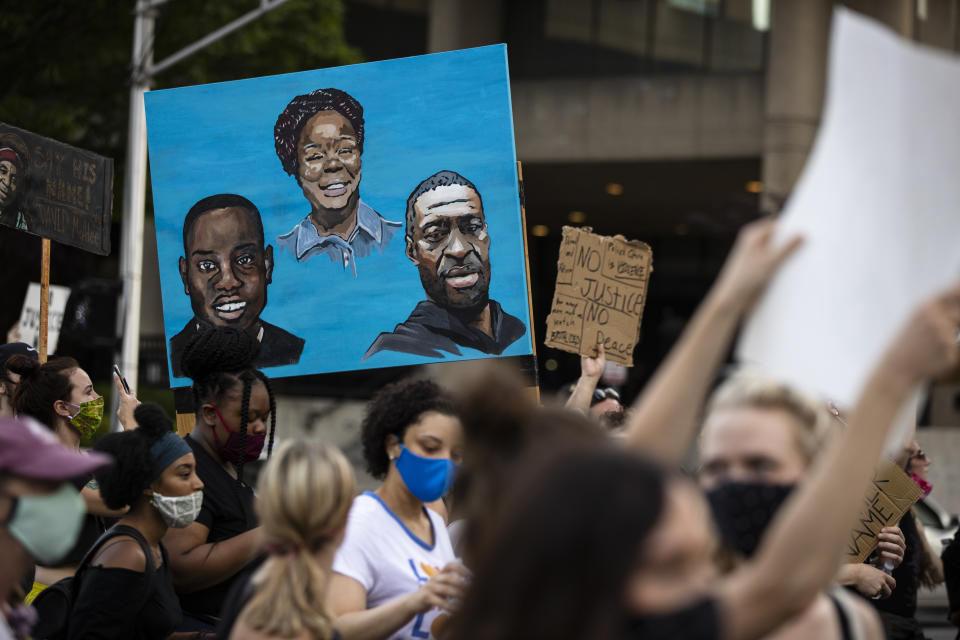Louisville small businesses caught in the middle as Breonna Taylor protests continue
In downtown Louisville, Ky., the ground floors of apartment complexes and storefronts are boarded up with plywood. Street telephone kiosks are tightly wrapped in cellophane so no phone calls can be made. The business district is barricaded off, and checkpoints have been set up to make sure those entering have a stated purpose for being there other than to protest.
For many residents of the community, the scene feels like something from an apocalyptic film, but it’s become the reality in Louisville following unrest that accompanied the decision last week by Kentucky Attorney General Daniel Cameron not to charge three police officers with homicide in the death of Breonna Taylor.
Normally bustling with people and commerce, the cordoned-off business district — an area stretching five blocks north to south and six east to west — is now the site of very little activity. There are only a handful of people on the streets and even fewer cars. The small number of businesses that remained open during the coronavirus pandemic feel even more rarefied since protests erupted on Sept. 23 over the decision in Taylor’s case.

By early that Friday morning, the protests had boiled over into full-blown rioting, leaving windows smashed in and property damaged in the downtown section of the city. Since then, Louisville residents and other supporters of Taylor have continued daily marches through the streets, decrying the police brutality and racial injustice that they say Taylor’s death, and the decision not to charge the Louisville Metro Police officers involved in her killing, epitomizes.
Caught up in the turmoil are the proprietors of the mom-and-pop shops and small businesses downtown that have taken a dramatic hit from both COVID-19 and the protests. Fearful for their safety, many locals say they no longer want to come downtown, and as a result, business owners have found themselves in the unenviable position of taking sides on the protests that threaten their livelihoods.
‘It’s just property’
Olivia Rose Griffin, owner of Riot Cafe and the Limbo, a tiki bar in downtown Louisville, likened the last several months to slow-motion whiplash.
“Everything changed when COVID hit for everybody, especially here downtown,” Griffin told Yahoo News. “There’s few people traveling here and they’re for business purposes, but we’re talking reduced so dramatically.”
Griffin said that when the news broke about George Floyd, an unarmed Black man who died in police custody in Minneapolis in May, Taylor’s case was put on the national radar. So it was little surprise that Cameron’s decision resulted in more protests in Louisville.
“The protests ramped up right away,” Griffin said. “Thursday night protests went into Friday night riots. And, in my opinion, that was the only night that we have ever experienced riots. There were serious riots, and they occurred mainly downtown, mainly on the corner where my businesses are located. A lot of glass was broken. A lot of businesses were looted.”

Yet Griffin said she understands the community’s anger. To her, damaged property is nothing compared with a life lost.
“It was very violating. However, it’s just property,” she said. “It’s just windows. It’s not people. Nobody died. … So that definitely drew a hard line in the sand. I’m sure in every city where there are riots, [there is a distinction] between the people and the business owners who believe that destruction of property is the worst thing ever, and those on the other side of the line that believe people are more important than property.”
‘The police officers are not bad people’
Richard “Red” Bryan is the owner of the Alley Way Cafe Restaurant, a dine-in and catering business in the Shelby Park neighborhood near downtown. It was right outside his restaurant where two police officers were shot the night Cameron announced his office would not pursue homicide charges against the officers who killed Taylor. After police approached him, Bryan turned over surveillance footage taken outside his restaurant to aid in their investigation of the shootings.
Already reeling from the slowdown in business due to the pandemic, Bryan’s losses have mounted over the last week.
“I built this company from the ground up … so when anything goes wrong it’s immediately my money,” he said. “It’s been tough.”
Yet Bryan refuses to blame the protesters.
“A lot of people think there are two paths to take, but as a Robert Frost guy, I want to take the path less traveled,” he said. “I stand with my neighbors and the people who live around me. … When my neighbors blockaded the road to keep everybody safe, I was with them. … That’s what we were doing.”
Bryan believes all the unrest wouldn’t be taking place if police had tried to save Taylor’s life after they shot her.
“She was on the ground not receiving medical attention,” he said. “They were finding a reason to bust down the door and not trying to save her life. … This could have been avoided if they calmed down and tried to save her, but they didn’t.”

A licensed gun owner, Bryan believes that if you pull the trigger of a gun, then you are responsible for its bullets. While he hasn’t had to shoot at anyone, Bryan has had to brandish his gun several times over the past few months, as his place has been ransacked on at least four occasions. He believes rampant homelessness, drugs and overall despair have contributed to a climate in Louisville that isn’t safe.
“The police are very strung out — a lot of them work two jobs,” Bryan said. “The police officers are not bad people, but they have bad days. … [The city needs to appoint] someone to work with the children, work with the mentally ill and the officers who need help.”
‘I have no problem with people protesting’
Buck’s Restaurant and Bar has been a part of the downtown community for 28 years, and its general manager, Lisa Imrie, said it has never experienced anything like the unrest of the past several months.
“It’s been a roller coaster up and down,” Imrie told Yahoo News. “With COVID and protests downtown, it’s hurt our business.”
While she blames the protests stemming from the Taylor decision for the cancellation of several large reservations, she also wishes more lasting solutions could be found to help her community.
“I have no problem with people protesting,” Imrie said. “But nothing ever changes through protests. It only changes through laws. You can’t prosecute anyone in the street. … It happens in the courts.”
Imrie lamented that the unity behind the Black Lives Matter movement following the death of Floyd seems to have been lost.

“It’s gotten totally out of hand,” she said. “When George Floyd happened, everyone was behind it. There is no message in it anymore.”
In part, Imrie said, that’s because the circumstances surrounding the two cases are different.
“She wasn’t all that she was made out to be,” she said. “This all had to do with drugs, which kills people. She was committing the crime. There is a lot more to it.”
(The three officers involved in the case were serving a no-knock warrant at Taylor’s apartment as part of a narcotics investigation into her ex-boyfriend.)
‘It’s not fair’
Mimi Kim, owner of Mimi’s Wigs, called the area around her shop “a ghost town.”
“[There’s been] no business,” said Kim, who has lived in Louisville for 26 years and has owned her wig shop for the past three. “Coronavirus was one thing, and on top of the riots, it’s wiped out every little bit of business that we’ve had.”
Kim’s shop was untouched in last week’s unrest, but she has been fearful that things could change any day. She said she has empathy for how the community feels, but added that small businesses are not to blame.
“I understand that what’s going on is not right,” she told the Courier Journal. “It’s not fair, but what’s going on has nothing to do with the small businesses. They shouldn’t be destroyed.”
_____
Read more from Yahoo News:
Kentucky's Black Republican attorney general comes under fire in Breonna Taylor probe
Shaq: We need sports 'to give these children something to do'
2 Black Senate hopefuls look to make history in the South — and fix health care while they’re at it
19 Black families purchase 96 acres of land to create a ‘safe haven’ for Black people



